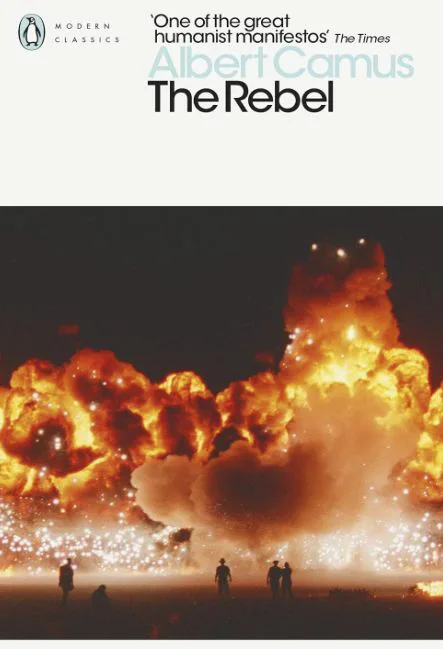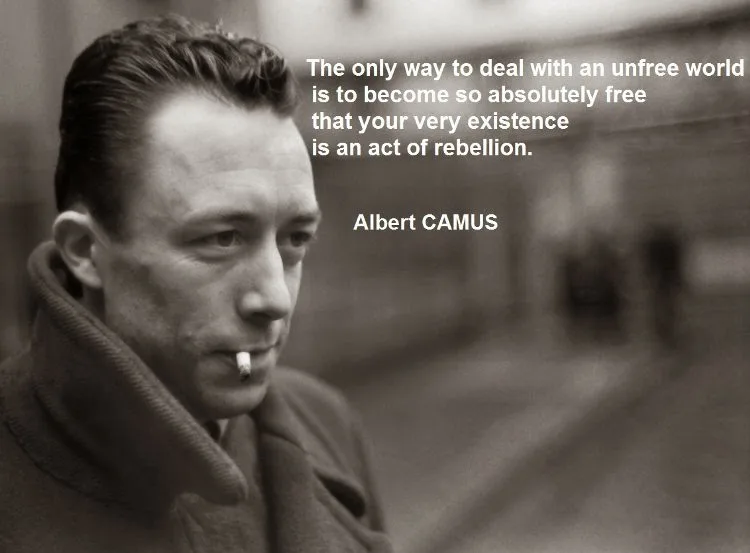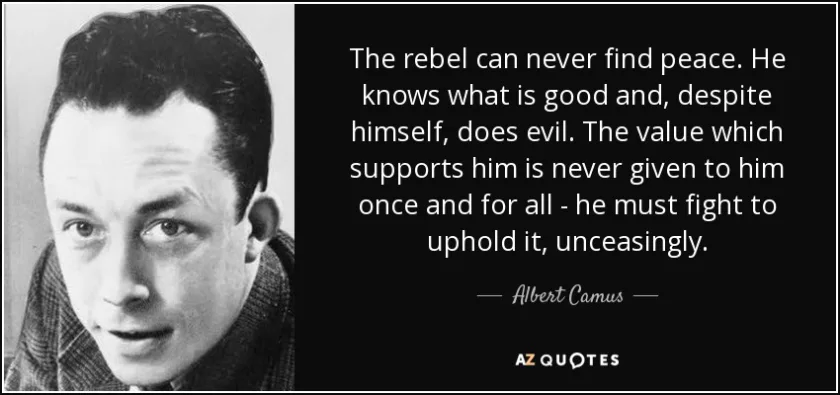
The Rebel by Albert Camus is an exploration of the implications of the act of rebellion in response to facing the absurdism that the world has to offer. It was first published in 1951.
This happens to be my second read after The Stranger by the same author. Being a collection of essays, the book lacks a conventional plot development. Moreover, it’s not an easy read. The following paragraphs resemble notes I took while reading the book. At the moment, I don’t feel equipped to review this work by Camus.
Part One: The Rebel
The book starts with its foundational inquiry, which is, what constitutes rebellion? We generally perceive rebellion as physical defiance, Camus however, doesn’t think like us. And so, gives us an existential interpretation. According to him, living itself serves as a validation of existence. Rebellion, then, becomes a manifestation of this affirmation of life. As it signifies a declaration that certain aspects of existence are worth defending and advocating for.
Camus explains that whether an action is earnest or not, is subjective. Hence, it is determined by the individual subject’s perception of it as good. Accordingly, from the perspective of the rebel, any act of rebellion is inherently ethical. Working further on the equation, being “inherently ethical” gives rise to awareness.
After all, heightened consciousness of ethical considerations makes individuals integrate them into their actions and decision-making processes. By understanding the potential consequences for themselves and others, they make more informed ethical choices.
Next, Camus compares rebellion with Nietzsche’s concept of ressentiment. As per Nietzsche’s argument a deep-seated resentment arises from the feelings of inferiority. So, obviously, it is characterized by negativity and bitterness. On the other hand, rebellion represents a positive assertion of one’s agency and autonomy.
Following this discussion, Camus proceeds to delve deeper into the concept of metaphysical rebellion. This involves questioning the very foundations of existence, including ethics, politics, and metaphysical beliefs.
Part Two: Metaphysical Rebellion
The second part talks about the lives of metaphysical rebels. These individuals continuously challenged the circumstances and systems in which they were in. According to Camus, these people were akin to blasphemers. Although, they did not reject the existence of a higher power, but they denounced the contemporary social order and its associated values.
Figures like Jesus, the founding fathers of nations, and ideological thinkers like Marx have challenged the very foundations of the prevailing cultural and moral order. They considered those as oppressive constraints on human freedom and dignity. Both had put in efforts to dismantle the dominant cultural and ideological framework. And replaced it with a new set of values that better aligned with their vision of justice and human flourishing.
Camus advocates that there has been a recurring theme of human protest throughout history. This persistent defiance reflects a deep-seated dissatisfaction with the contemporary order and a yearning for a more just and meaningful existence. Understanding the underlying metaphysical motivations of historical rebels leads him to explore historical rebellion further in the subsequent part of his work.

Part Three: Historical Rebellion
In part three he suggests that while both rebels and revolutionaries may seek change and freedom, their approaches and motivations differ significantly.
Rebellion, as he describes, is limited in scope and is essentially an individualistic assertion of freedom. It is akin to personal response to oppression or injustice. Revolution, on the other hand, operates on a broader scale and originates in the realm of ideas. It leads towards reshaping society according to a particular ideology.
Rebel, therefore, is a creator of values. By engaging in acts of rebellion against unjust authority or oppressive systems, the rebel asserts their autonomy and contributes to the ongoing evolution of ethical and moral frameworks.
Unlike revolutionaries, who seek to impose their ideas on society, rebels carve out their own path and inspire others through their individual actions and experiences. Focusing on Hitler and Mussolini, Camus says that they upheld historical ethnic values and pursued power rather than new ideals. Therefore, both cannot be classified as rebels.
Part Four: Rebellion and Art
In part four, Camus talks about connection between rebellion and an artist. Artists, as per him, constantly challenge societal norms and perceptions. With their art, they urge us to reconsider our beliefs. So, like a rebel, an artist too creates and destroys, and eventually reshapes our understanding of the world. They ascend by rejecting traditional values, meaning, and purpose.
Therefore, there is no denying of the fact that both art and revolution emerge as responses to an existential crisis. After all, they both attempt to grapple with the absence of absolute truths.
Part Five: Thought at the Meridian
In part five, Camus reflects on humanity’s current position in history. He notes the significant changes that the 20th century has brought, some of them were:
- the diminishing influence of religion
- the emergence of tragic global events such as the world wars and genocides
Despite these upheavals, there happens to be a greater tolerance and conformity to societal norms. Camus finds this trend quite disturbing. Also, there is a shifting perception of the rebel. Once viewed as a symbol of resistance against injustice, the rebel is now seen as a tyrant. And oppressive regimes are increasingly tolerated.
However, Camus holds onto the idea of the rebel spirit remaining alive despite the challenges and shifting perceptions. He sees hope in the persistence of injustices, restrictions on freedom, and violence in the world. Because of all these oppositions, there will never be a singular, fixed standard of ethics. Therefore, the underlying spirit of rebellion will never be extinguished.

Takeaway
Camus’s existential perspective highlights that if one has to live authentically, then one must reject historical norms. Only by relinquishing the notion of predetermined purpose, individuals can challenge societal limits and find personal meaning.
This suggests an intriguing concept: purpose isn’t an external entity but rather something intrinsic to oneself. It involves affirming certain aspects of life while rejecting others. A process driven from within. And there’s a constant interplay between affirmation and rejection, again originating from “within”. In Camu’s words,
“At the end of this tunnel of darkness, however, there is inevitably a light, which we already divine and for which we only have to fight to ensure its coming. All of us, among the ruins, are preparing for a renaissance beyond the limits of nihilism. But few of us know it.”
Once we realise and in fact, carry out day to day activities with one realisation that the purpose resides within us. We, then, begin to create values, embrace life, and potentially attain profound happiness. When this abstract notion concretizes, it becomes discernible that external forces will not dictate our essence. And this is called the existential journey, which progresses from darkness towards the light and of course converges at peace and fulfilment.
At times, reading Albert Camus can be challenging, but there’s a moment when everything starts to make sense. I find myself unable to ignore his ideas. If you haven’t read his books, you’re really missing something amazing and different in classic literature. By the way, I want to give a huge shoutout to The Anarchist Library, where I found and read the book.



